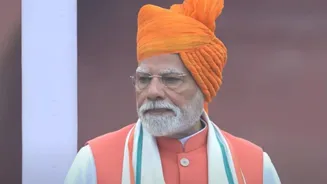Prime Minister Narendra Modi, in his Independence Day address from the Red Fort, emphasised the government’s focus on achieving energy independence and expanding private participation in the nuclear sector.
“We know that we remain dependent on many countries to meet our energy needs. But to build a truly self-reliant India, we must achieve energy independence,” he said.
Highlighting recent strides, Modi noted that India’s solar energy capacity has grown thirtyfold in the past eleven years. “We are constructing new dams, and India is now focusing actively on nuclear energy. We have taken significant steps in this direction, with 10 new nuclear reactors currently operational. By the time India celebrates 100 years of independence, we aim to increase our nuclear energy capacity tenfold,” the Prime Minister added.
The remarks signal a push not just for renewable expansion but also for diversifying the country’s energy portfolio, with nuclear power expected to play a central role in meeting future demand while reducing dependence on imports.
Prime Minister Narendra Modi said India is undertaking major initiatives in the nuclear energy sector, targeting a twelvefold increase in the country’s nuclear power generation capacity by 2047.
“Reform is a continuous process… We have introduced significant changes in the nuclear energy sector. The field of nuclear energy has now been opened up to the private sector,” he said.
India’s Stand On Nuclear Energy
India is preparing to open up parts of its nuclear sector to private participation, aiming to end a decades-old state monopoly over uranium mining, imports, and processing, two government sources told Reuters. The move is intended to attract billions of dollars in investment and accelerate the growth of the industry.
The Modi government has set a target to expand the country’s nuclear power generation capacity twelvefold by 2047. As part of this plan, it is also easing rules to allow foreign players to take minority stakes in nuclear power plants, Reuters reported in April. If the target is met, nuclear power would account for about 5% of India’s total electricity supply, according to government estimates.
Until now, the state has maintained exclusive control over the mining, import, and processing of uranium due to concerns over the potential misuse of nuclear material, radiation safety, and national security. While the government will continue to control the reprocessing of spent uranium and the management of plutonium waste— in line with global norms— it plans to introduce a regulatory framework to enable private Indian firms to mine, import, and process uranium to meet the expected surge in fuel demand as nuclear capacity expands.





















